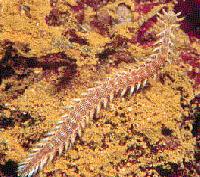

Regardless of whether they can control their behaviour, nematode worms are certainly capable of associative learning - i.e. "true" learning as defined by Kilian and Muller (2001). Should philosophers call this "learning"?
I believe that philosophers should respect the norms of popular usage when using everyday words. In keeping with these norms, I suggested earlier that the word "learning" be reserved for mental states, wherever possible. However, popular norms may clash in special cases. I also quoted a dictionary definition, according to which acquiring a skill by experience qualifies as learning. There is good evidence that some worms, whether or not they possess mental states, are capable of acquiring skills through experience. They can be conditioned to avoid a stimulus that they were previously attracted to. The ability to change one's preferences may turn out to be biologically useful for an animal, so it surely deserves to be called a skill. I suggest that we should regard conditioning as a form of experience (i.e. training) without committing ourselves at this stage as to worms have subjective inner states. Being conditioned to change one's preferences is therefore acquiring a skill through experience. It follows that some worms can learn, regardless of whether they have mental states or not. They are "educable" creatures.
L.9 The ability of an organism to undergo associative learning (classical and/or instrumental conditioning) is a sufficient condition for its being able to learn, in the proper sense of the word.
To sum up: recent research has shown that roundworms (nematodes) are capable of associating stimuli when they undergo classical conditioning. These simple worms represent a breakthrough in mind-like behaviour: they are educable creatures, capable of true learning. However, it has not yet been shown that they are capable of genuine trial-and-error learning (operant behaviour, as defined by Abramson). More research needs to be done on flatworms (platyhelminthes) before we can say that they are even capable of true learning.
A note on Dennett's mental hierarchy
Dennett (1997, p. 112) describes organisms with a capacity for associative learning as "Skinnerian creatures". They occupy the second level in his hierarchy of mind-like organisms (1997, pp. 109 ff.), above Darwinian creatures (described in the section on viruses). Unlike Darwinian creatures, Skinnerian creatures have bodies whose response patterns can be altered by their experiences. A Skinnerian creature is capable of getting positive or negative feedback about its actions, which makes it more likely to select an advantageous course of action and avoid misfortunes in the future (this is what we call operant conditioning). Such a creature can learn from its trial-and-error mistakes and successes - in other words, it can associate information about one kind of event with information about another kind. At this level of cognition, trial-and-error improvement goes on inside the creature's brain and nervous system, instead of at the genetic level.
Do roundworms qualify as "Skinnerian creatures"? If we adopt Dennett's definition of "Skinnerian creatures" as organisms with a capacity for associative learning, whose response patterns can be altered by their experiences, the answer is yes. However, Dennett also defined Skinnerian creatures as animals that are capable of trial-and-error learning from their past mistakes and successes, i.e. operant conditioning (1997, p. 112). On this criterion, it is not clear that roundworms qualify. It may turn out that there are creatures that are capable of associative learning but incapable of operant behaviour. Dennett may have conflated two stages in his mental hierarchy.
Back to Chapter 2 Back to current topic page - Learning and mental states